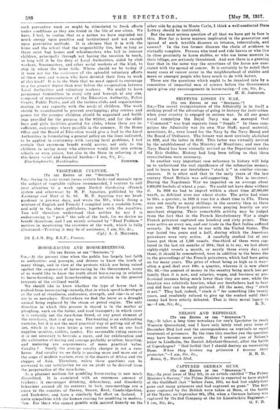SHIPPING LOSSES IN WAR.
[To THE EDITOR OF THE " SPECTATOR."] SIR,—The recent reorganization of the Admiralty is in itself a striking proof of the advantage of going to history for instruction when your country is engaged in serious war. In all our great naval campaigns the Royal Navy was so managed that " Command " was kept separate from "Supply." In those cam- paigns the Admiralty was its own War Staff; naval material, munitions, he., were found for the Navy by the Navy Board and the Board of Ordnance. The former was most unwisely abolished in 1830, and the latter in 1856. This latter was virtually revived by the establishment of the Ministry of Munitions; and now the Navy Board has been virtually revived as the Department under Sir Eric Geddes. History had long been telling us that these resuscitations were necessary.
In another very important case reference to history will help es to understand the real significance of the submarine menace, and to learn how our forefathers "stuck it" in similar circum- stances. It is often said that in the early years of the last century Great Britain was self-supporting. This is incorrect. During the Napoleonic War we imported on an average about 4,800,000 bushels of wheat a year. We could not have done without it. In 1810 we had to import within a short time .27,000,001) worth, so deficient were our -wheat stocks. The price had risen to 116s, a quarter; in 1813 it rose for a short time to 171s. There were not nearly as many shillings in the country then as there are now. The French privateers were preying heavily on our merchant shipping. Their remarkable activity may be judged from the fact that in the French Revolutionary War a single French privateer captured one hundred and sixty prizes. They were active on every sea, and our trade in the East Indies suffered severely. In 1812 we went to war with the United States. The war lasted two years and a half, during which the American privateers were very active. A carefully studied list of our losses put them at 1,599 vessels. One-third of these were cap- tured in the last six months of 1814; that is to say, we lost about eighty-eight vessels a month, or nearly three every day; and these, it should be remembered, were in addition to the losses due to the proceedings of the French privateers, which had been going on for many years. The price of wheat being as high as it was— often a good deal over 100s. a quarter, whereas it is now about 83s. Gd.—the amount of money in the country being much less per family than it is now, and salaries, wages, and business or pro- fessional incomes being much lower than they are now, while the taxation was relatively heavier, what our forefathers had to bear and did bear can be easily pictured. All the same, they "stuck it out." They bad, indeed, "stuck it" for something like twenty years, and resolutely refused to give up the contest until their enemy had been utterly defeated. That is their moral legacy to


























 Previous page
Previous page